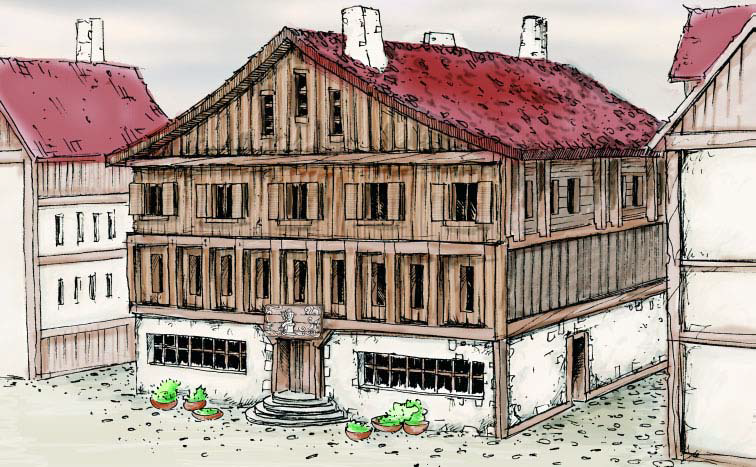
SESSION 24B: THE MEETING OF ALL THINGS
June 21st, 2008
The 11th Day of Kadal in the 790th Year of the Seyrunian Dynasty
Having returned from the Pale Tower and the Brotherhood of Redemption, Tee pulled Ranthir aside and spoke with him regarding the golden key they had recovered from Pythoness House. It was the only direct connection they had to their missing memories, and Tee felt strongly that they should pursue it as rigorously as possible. She wanted Ranthir to research it at the Delver’s Guild Library as soon as possible.
But as they discussed it, they realized that they had a wider need to take stock of what they had accomplished, analyze what remained to be done, and make some hard decisions – as a group – regarding what their immediate and long-term goals should be.
As the others returned to the inn, therefore, they gathered them together in Elestra’s room.
Tee asked the most important question: What are our immediate goals?
IRON MAGE & THE HAMMERSONG VAULTS
Ranthir pointed out that they had only two firm commitments: The Iron Mage had asked them to collect a crate from the Freeport’s Sword on the 21st. And, on the 27th, they would gain access to their Hammersong Vaults.
Elestra, looking at the calendar, realized it was her own birthday. She had completely lost track of time.
Tee grinned, “My birthday is on the 14th.”
THE GOLDEN KEY
Tee again raised the issue of the golden key, and the others agreed that Ranthir should research it as soon as possible.
“Should we use the key to open the Vaults?” Elestra asked.
Tee shook her head emphatically. “It’s too dangerous. It felt like it was draining the very life out of me. It could almost certainly kill any of us. Since we’re going to be able to access the vaults without using it, I think it’s better if we just wait.”
GHUL’S LABYRINTH
Dominic mentioned Ghul’s Labyrinth. “Should we finish exploring down there?”
“And there was still a lot of treasure we needed to recover,” Tee pointed out.
Ranthir pulled out the carefully executed map he had been drawing during their explorations. He pointed out the areas they hadn’t fully explored yet, including the sealed vault door they hadn’t been able to get past. “We could also get rid of the tainted items Mistress Tee is carrying.”
Tee emphatically agreed with that idea. And she was also in favor of taking the time to loot the more cumbersome treasures: Her own funds, in particular, were once again beginning to dwindle.
At this point Agnarr mentioned that he had just gotten back from the tunnels beneath Greyson House.
Tee was shocked. “What were you doing down there? Why did you go down there alone?!”
Agnarr quickly explained what his plan had been.
“You don’t speak goblin!”
Agnarr shrugged. “But I wasn’t the only one down there.” And he quickly explained what he had seen.
Ranthir pointed out that they had sold the location of the orrery, and that it was probably just workers from House Erthuo retrieving it. Tee agreed that it was likely, but they all agreed that they should confirm that sooner rather than later.
THE NIGHT OF DISSOLUTION
Then began the bulk of the evening’s work: The reading, sorting, and analyzing of the mass of paperwork – letters, notes, maps, books, and the like – that they had accumulated over the past several weeks.
Tee called their particular attention to the Night of Dissolution.
The first reference had been found among Helmut’s astronomical predictions: “The key is found. The lost shall be found. The night of dissolution comes when the barbarians arrive.”
Then a reference in Maquent’s journal from Pythoness House: “Radanna and her friends have become obsessed with the ‘Night of Dissolution’. They will speak of almost nothing else. They are convinced that the ‘coming changes have arrived’.” And later in the same journal: “The cultists say the hidden weapons will strike down their enemies on the Night of Dissolution. I no longer care. Their true future is too entwined with chaos to foretell with any accuracy. Perhaps what they say is true. I do sense great changes in the next few years.”
One of the minotaurs beneath Pythoness House had also said: “Ah, the Night of Dissolution is come at last!” As if they had expected to be awakened only when that night had come.
And in The Truth of the Hidden God, one of the chaos lorebooks they had discovered, the last few pages were a prophetic rambling of sorts, beginning with the words: “In the days before the Night of Dissolution shall come, our pretenses shall drop like rotted flies. In those days the Church shall be broken, and we shall call our true god by an open name.” The book went on to describe the faux religious practices for a fanciful “Rat God”, with the apparent intent that a church could be openly established for this “god”. Eventually, the prophecies say, even this “last pretense” would be abolished and “Abhoth shall be worshipped by all who are not blooded by the knife.”
“I’m worried that we’re somehow responsible for bringing about this ‘Night of Dissolution’… whatever it is,” Tee said. “We found the key. And the ‘Church shall be broken’, isn’t that Rehobath has done?”
“It sounds like an apocalypse,” Elestra said. “How can we be responsible for the apocalypse?”
“Well… Are we causing it? Or are we supposed to stop it?” Dominic asked. “Is that what we were trying to do?”
“Maybe the golden key is an essential part of whatever brings the Night of Dissolution about,” Tor suggested. “Maybe we were looking for the key in order to stop the cultists from doing whatever it is they’re doing.”
“If that’s the case,” Tee said, “Then Wuntad is going to come looking for it. And for us.”
“All the more reason we should get out of the Ghostly Minstrel,” Tor said. “Everyone knows we’re here. We should get a house. Try to find some place private.”
“We could move into Pythoness House,” Agnarr suggested.
“It would certainly give me room to study,” Ranthir agreed.
THE GALCHUTT
Studying the Truth of the Hidden God drew Ranthir’s attention to the Galchutt. The Brotherhood of the Blooded Knife, to which the cult manual was dedicated, practiced blasphemous rituals of human sacrifice. These sacrifices were dedicated to a Galchutt named Abhoth, who the cult venerated as the “Source of All Filth” and the “Lord of the Zaug”.
But the first time they had encountered the name Galchutt was in the final, fragmented pages of Morbion’s journal: “JUIBLEX. HE IS OF THE GALCHUTT. THEY ARE—“
And “Blades of the Galchutt” had also been inscribed on one of the chests beneath Pythoness House. Specifically, the chest containing two matched longswords of blackened steel with hilts carved in the shape of demons’ heads.
This discussion of the Galchutt made Tee remember something: The Book of Faceless Hate, the queer volume she’d discovered in Pythoness House and then forgotten about in the chaos which had followed. Ranthir set to work deciphering the hard-to-read text…
THE BOOK OF FACELESS HATE
No title marks the tattered, dark brown cover of this book. Its contents are written in a nearly illegible scrawl that could only have been born of hopeless madness. The first several pages of the book are covered in repetitions and variations of a single phrase: FACELESS HATE. (They wait in faceless hate. We shall burn in their faceless hate. The faceless hate has consumed me. And so forth…)
CHAOS: True chaos, or “deep chaos”, is a religion based on the fundamental aspects of hate, destruction, death, and dissolution. The philosophy of chaos is one of constant and endless change. It teaches that the current world is a creation of order and structure, but that it was flawed from the dawn of time due to the lack of foresight into what living sentience truly wants and need. The gods of creation – the gods of order – are untouchable and unknowable. They are aloof and uncaring, says the teaching of true chaos.
THE LORDS OF CHAOS: According to the book, the Lords of Chaos – or “Galchutt” – are gods of unimaginable power. But they are “mere servants of the true gods of change, the Demon Princes”. It is written that the Galchutt came to serve the Princes during the “War of Demons”, but while the Princes have “left this world behind”, the Galchutt still “whisper the words of chaos”.
VESTED OF THE GALCHUTT: Although they sleep, the Galchutt still exert some influence upon the world. This influence can be felt by the faithful through the “touch of chaos” and the “mark of madness”, but it can also be made manifest in one of the “Vested of the Galchutt” – powerful avatars of their dark demi-gods’ strength.
CHAOS CULTS: The book goes on to describe (but only in the vaguest of terms) many historical and/or fanciful “cults of chaos” which have risen up in veneration of either the Galchutt, the Vested of the Galchutt, or both. These cults seem to share nothing in common except, perhaps, the search for the “true path for the awakening of chaos”. The book would leave one with the impression that the history of the world has been spotted with the continual and never-ending presence of these cults – always operating in the shadows, save when bloody massacres and destruction bring them into the open.
All of this material suggested a connection between Morbion, the gods worshipped in Ghul’s Labyrinth, and the modern chaos cults.
DREAMING & CHAOS
Speaking of the worship of chaos, was there a connection between the Dreaming and Chaos?
When they had first awoken in their rooms, both Ranthir and Tee had in their possession copies of a work known as The Dreaming Arts. There were also their common experiences with the Dreaming Apothecary.
None of them were entirely sure what the Dreaming was, but they had also seen references to it in the Notes on the Corruption of Wa’tuel from the research material they had recovered from Shilukar’s laboratories. The exact nature of the “corruption” remained unclear, but there were references to a “theft of Dreams” and a “severing of the Dreaming” which would “result in an utterly alien character”.
Similarly, Shilukar’s Notes on the Blood of Ravvan had contained references to the Dreaming: Those suffering the “dreamless corruption” and “trapped in the Dreaming stasis” appeared to be “more receptive to the whispers of the Beast”.
This discussion reminded Tee and Agnarr of a notebook they had recovered from a reptilian sorcerer named Serrek Tarn in the adventures they remembered immediately prior to their amnesia. Amidst a mad scramble of mathematical notations and geometric enigmas, there had been several legible fragments, including:
“Lessons from the tainted dreaming” (written in a large bold hand near the top of the notes)
“Sessural is the depth and the circumference”
“The bastion of purity is not untouched. If it could be destroyed—then victory.”
“The shard has not been found.”
“The inner eye sees all, but all there is it does not see.”
“To see the blackness, one must look into their own soul. The blackness is of the body and the bone and the blood.”
“The dreaming must be made one with reality. The key is the sanctuary; the sanctuary is the key; and the apprentice of the One Who Speaks in Dreams shall be the master’s voice within the world. When he is made whole, the endtimes of the beginning shall renew.”
There seemed to be a connection between the chaos and taint of chaositech and the chaos and taint of the Galchutt. Was there also a connection between chaositech, the Galchutt, and the “tainted Dreaming”? None of them could guess.
SILION
Another name that they had multiple references to was “Silion”. They had first found this name in a letter recovered from Linech Cran’s office: Silion had written to Cran demanding delivery of a shipment (presumably of shivvel). The name Urnest, an associate of Silion’s, had also been mentioned in this letter.
The name had been mentioned again in papers recovered from Shilukar’s lair. A report from Shilukar’s minions had read: “We have been contacted through intermediaries by Silion. They have apparently obtained a bone of iron that requires repair. They inquire as to whether your services might be available?”
Who were Silion and Urnest? And had there been, as Elestra now suggested, some sort of connection between Shilukar and Cran?
This discussion also stirred Dominic’s memory: While discussing the results of their mission to Cran’s with Mand Scheben, Dominic had mentioned the name Silion. Scheben had noted that the name belonged to a lascivious and rather unkempt priestess who ran a small and disreputable temple somewhere down on the Street of the Gods. He had meant to follow up on it, but then Phon had disappeared and it had simply slipped his mind.
RAVVAN
Sifting through the papers from Shilukar’s lair brought Tee’s thoughts back to the Idol of Ravvan. She considered it to be a major threat, in no small part because the mention of it had clearly given Lord Zavere himself considerable worry.
“We should make it a priority to find the Eyes of Ravvan and the Idol of Ravvan.”
Everyone agreed… but they had no leads.
“Wait a minute,” Tor said. “Could it have been Wuntad who took the idol? The gardener we rescued said that a litorian was among those who had taken it.” And there was litorian among those following Wuntad when he had ambushed them at Pythoness House.
“It’s possible,” Tee nodded. But since they didn’t know where Wuntad was, either, it didn’t help much. Besides, she wasn’t sure that she wanted to find Wuntad. Their first meeting had ended poorly.
HELMUT’S PROPHECIES
They had found Shilukar by using the prophecies they had discovered at Helmut’s house. That alone made it clear that the prophecies had at least some validity to them. In the hope of finding similar insight, they turned their attention to the rest of these prophecies and collated the following commentaries on them:
Sitting alone at night. H upon the scope of the sky. A slight flame comes out of the void and makes true that which should not be believed in vain.
H could be Helmut, the astronomer who “sits upon the scope of the sky”.
When the crowd gathers upon the hill in the oldest town, the new republic shall be troubled by its people. At this time the lord shall be weak.
This seemed like a clear description of the Riot in Oldtown. It had led them to the conclusion that Helmut was not just interpreting the prophecies, but working to bring them about or use them to his advantage.
In the world there will be made a king who will have little peace and a short life. At this time the ship of the Novarch will be lost, governed to its greatest detriment.
They theorized that “the ship of the Novarch will be lost” could refer to Rehobath declaring himself Novarch-in-Exile – although whether that referred to Rehobath or the Novarch in Seyrun was unclear. If “the ship” referred to the Church, then it could be assumed that Rehobath’s actions would not be to its favor.
Could “the king who will have little peace and a short life” refer to Dominic’s role in Rehobath’s ascension?
S shall find the golden statue while it still breathes. But the Idol of Ravvan brings doom. His lair lies beneath a vacant lot of brandywine.
This was the prophecy which had led them to Shilukar’s lair. The “golden statue” most likely referred to Lord Abbercombe.
They will be driven away for a long, drawn out fight. The countryside will be most grievously troubled. Town and country will have greater struggle. Salesia and Corinthia will have their hearts tried.
Salesia was the capital of Arathia and Corinthia lay on the eastern edge of the Southern Pass (a city-state jointly held by Arathia, Barund, and Seyrun).
The wands must be selected before the swords.
Ranthir had found a set of notes jammed into a book at Helmut’s house. These notes included the phrases “What are the staves of Ghul?” and “Asche shall deliver the Swords of the City”. Ranthir wondered whether this meant that the staves of Ghul needed to be selected before the Swords of Ptolus… whatever that meant.
The eye of Ravvan will be forsaken, when his wings will fail at his feet. The two of Ptolus will have made a constitution for Amsyr and Duvei, which the goblins will trample underfoot.
Duvei was an Arathian city-state. Amsyr was a Vennocan city-state. The identity of the “two of Ptolus” was unclear.
The Eye of Ravvan had been mentioned among Shilukar’s papers and associated with the Idol of Ravvan.
Ranthir raised the possibility that the goblins might “trample underfoot” simply by walking under their feet… in other words, to live underground. So this might be a reference to the Clan of the Torn Ear.
Arrived too late, the act has been done. The wind was against them, letters intercepted on their way. The conspirators were fourteen of a party. By the street of kings shall these enterprises be undertaken.
A reference to “brandywine” had led them to Brandywine Street. It was possible that the “street of kings” could refer to the King’s Road in the Nobles’ Quarter.
How often will you be captured, O city of the sun? Changing laws that are barbaric and vain. Bad times approach you. No longer will you be enslaved. Great H will revive your veins.
The mimics have seen the lance. Doom.
When Tee had been struck by madness in Ghul’s Labyrinth, she had been left with two sentences burning in her mind: “The lance is being built. The runebearers will not come in time.”
The knights out of time shall move again. Their oath shall not be broken, though their dreams lie shattered like their city.
Tee wondered whether this might refer to the strangely armored figure they had seen on the street outside of Greyson House.
A coffin is put into the vault of iron, where seven children of the king are held. The ancestors and forebears will come forth from the depths of hell, lamenting to see thus dead the fruit of their line.
After combat and naval battle, the great ??? in his highest belfry: Red adversary will become pale with fear, Putting the great Ocean in dread.
The elves shall quarrel. Dark out of the depths. Blood shed under silver moonlight
Vehthyl and Itor, and the silver joined together. Beyond the depths of the Deeps, one will say the ether trembles.
Could the first sentence somehow be a reference to Dominic and Urlenius?
Ranthir knew that the Deeps were the mid-point of the Southern Pass. The city of Deeptown lay near their center.
The rune born of crime (DB???) will walk the clouds.
This prophecy had led them, inadvertently, to Dullin Balacazar and the unknown catastrophe which had beset the Cloud Theater. (“And let’s not do that again,” Tee said.)
When they will be close the lunar ones will fail, from one another not greatly distant. Cold, dryness, danger towards the frontiers, Even where the oracle has had its beginning.
The key is found. The lost shall be found. The night of dissolution comes when the barbarians arrive.
Could the key refer to the key they had found in Pythoness House? Could “the lost shall be found” refer to their memories?
“And is Agnarr the barbarian?” Dominic said.
“Well, he’s large,” Tee said. “But I don’t think he’s large enough to count as multiple barbarians.”
“Then perhaps the night hasn’t quite started yet if we aren’t the barbarians this refers to,” Ranthir said.
The warrens are opened. Great evil pours forth. No seal may be found while the heart remains untouched.
Could this be a reference to the Banewarrens? There had been two references to them before: The schematics for a “Drill of the Banewarrens” that they had discovered in Ghul’s Labytinth. And the Prophecy they had found scrawled on the wall of Pythoness House: “The Saint of Chaos shall return and the Banewarrens shall ope their maw. And the name of doom shall be Tavan Zith.”
Within the closed temple the lightning will enter, the citizens within their fort injured. Horses, cattle, men, the wave will touch the wall, through famine, drought, under the weakest armed.
THE SEALED BOX
Although they had identified the golden key from Pythoness House as their only connection to their lost memories, they realized that there was another: The sealed box that Ranthir had found in his room after waking up with amnesia.
It was an enigma. And like any lock she couldn’t open, it seemed to be taunting Tee.
But Ranthir hadn’t entirely forgotten it, either. He had been preparing more powerful spells that could be used to unlock the chest… but they didn’t work, either.
They decided on two courses of action for the next day. First, Ranthir would go to the Delver’s Guild Library and research the golden key.
The rest of them would go down into Ghul’s Labyrinth and check on whoever was down there. After Tee’s equipment from the Dreaming Apothecary arrived, they would return to Ghul’s Labyrinth and open the doors that had previously eluded her skill.
“And if nothing else, we’ll have finished something,” Agnarr said.
NEXT:
Running the Campaign: Lore Book Meetings– Campaign Journal: Session 24C
In the Shadow of the Spire: Index

















